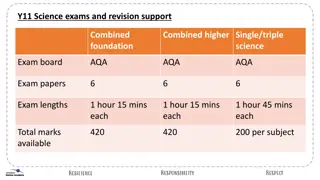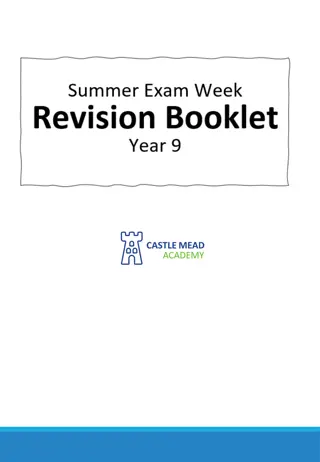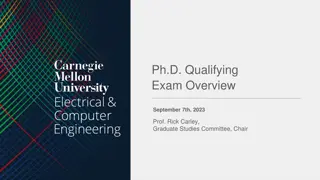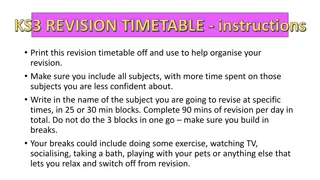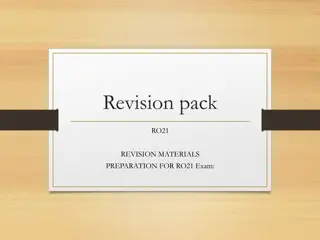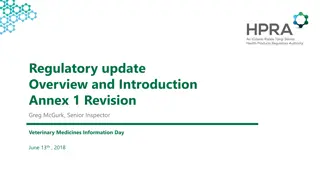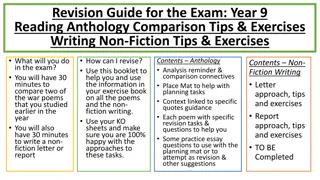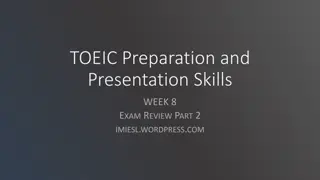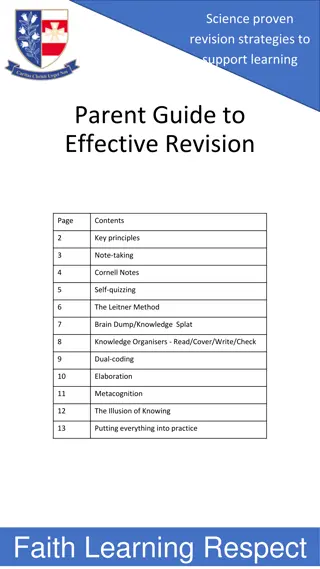Effective Exam Revision Strategies for Success
Get ready for your exams by planning your revision, developing key skills like time management and note-taking, and understanding effective revision techniques. Make use of long-term and short-term schedules, organize your notes, and use mnemonic devices to aid memorization. Stay focused, manage stress, and aim for optimal performance in your exams.
Download Presentation

Please find below an Image/Link to download the presentation.
The content on the website is provided AS IS for your information and personal use only. It may not be sold, licensed, or shared on other websites without obtaining consent from the author.If you encounter any issues during the download, it is possible that the publisher has removed the file from their server.
You are allowed to download the files provided on this website for personal or commercial use, subject to the condition that they are used lawfully. All files are the property of their respective owners.
The content on the website is provided AS IS for your information and personal use only. It may not be sold, licensed, or shared on other websites without obtaining consent from the author.
E N D
Presentation Transcript
Revision and exams get ready www.kent.ac.uk/student-learning-advisory-service
Start thinking about Start thinking about How to do as well as possible in your exams: Planning your revision Revision skills Exam techniques Essay writing in exams Online exams Managing exam stress This is a general introduction, other skills development sessions offer specific guidance on each of these topics.
Planning your revision Planning your revision You will need to: Find out about the exams you will be taking - modules, topics, number, dates, weighting, credits. Get organised - files, notes, workspace (revision HQ) Create a long-term revision schedule - setting out a program of revision leading up to each exam Draw up realistic weekly revision schedules - to carry out this program in a focussed and achievable way
Sample: short-term schedule mon tues wed thurs fri sat sun 8 - 10 9:00 Dentist 10-12 Proof-read & submit final essay SA300 Note-take journal article C MA301 Crib cards: topics 5-8 MA301 Review past papers MA301 Review week s notes and create crib cards EC302 W O R K W O R K 12 - 1 Note-take journal article A MA301 Review notes EC302 Refine lecture notes EC302 G Y M 2 - 4 Review lecture notes EC302 Practise 10-minute essay plans Re-read Core text Ch 1-2 EC302 Test Paper EC302 4 - 6 Chapters 1-3 Book B SA300 Crib cards: topics 1-4 MA301 Plan next week s revision Food shop and Sue s BBQ Test paper SA300 eve Tidy and organise all module notes Online Revision Group MA301 Review next week s schedule
Revision skills Revision skills As well as planning, effective revision involves: Understanding the module - structure, purpose, sequence of topics, links between them Working with your notes - Organising by topic, identifying key issues, terms and examples - Convert to forms that help you understand and remember. (e.g tables, charts, spider diagrams) - Portable versions (index cards, memos on your phone) to revise on the move
Revision skills Revision skills Effective revision also involves: Memorising (find what works for you, and suits the subject matter) - Mnemonics (Rinse Out Your Greasy Bottle In Vim = colours of rainbow) - Reading out loud, reciting ideas, formulas, dates - Portable notes, movable post-its on a wall (unlearned > learned) - Repetition Reviewing and practising (to help find and plug gaps in your knowledge) - Question cards (question one side/answer on reverse) - Working in pairs (testing each other, online or in-person) - Past exam papers
Exam techniques Exam techniques Read instructions twice be clear what you have to do Choose questions carefully (if given a choice) Plan and work tactically - Multiple choice (answer easy questions first, then not sures, then no ideas) - Essays (highest points/easiest questions first) Draw up a schedule to ensure you complete the whole paper Allocate time according to points value Allow time to check and tidy your work before submission Keep moving - work right up until the end
Essay writing in exams Essay writing in exams Choose essays carefully (if given a choice) Work to a schedule to complete them all - allot time according to points weighting; easy/high points questions first Plan your essay before you write (5-10 minutes) - understand it, list what you know about it, order key points logically Stick to your plan - brief introduction, key point + support, key point + support (etc), conclusion Write clearly, economically (avoid waffle) and legibly Allocate time at the end for checking and tidying - delete rough workings, ensure amendments are clear, label accurately
Online exams Online exams Prepare in advance Know when, how and in what format each exam will take place Understand the relevant university exam policies Ensure you have the required technology up and running The day before Create a quiet, comfortable workstation in which to sit your exam Check IT equipment is fully charged (keep charger to hand) Check you can upload documents Assemble other equipment - pens, notepads, calculator (if approved)
Online exams Online exams On the day Check everything is ready and as expected Ensure you will not be disturbed ( exam in progress ) Turn off phone (unless instructed otherwise by convenor) Keep track of time using your computer clock Stay hydrated have water to hand Apply effective exam techniques Other resources See SLAS study guide: Planning, Revision and Preparation for Online Exams (which includes links to online exam policy guidance and technical support)
Managing exam stress Managing exam stress Prepare well (revision, technology) and in good time Stay healthy (sleep, exercise, good diet, rest and relaxation) Do not revise up to the last minute Eliminate potential sources of stress (e.g. ensure your phone is off) If overwhelmed pause (breathe, review progress, plan next step, continue) Additional support (Student Support Officers, ILPs, Student Support and Wellbeing) https://www.kent.ac.uk/studentsupport/
Summary Summary Key considerations: Understand what, when and how your exams will occur Plan your revision schedule accordingly Create a workspace to revise and take your exams (if online) Ensure you have the necessary technology in place Develop and use revision skills and exam techniques Pace yourself to arrive (at the exams) in good shape Above all, start your revision as early as possible
Further resources Further resources For guidance on the broader range of revision and exam skills please go to the SLAS webpages http://www.kent.ac.uk/student-learning-advisory-service where you can: Book a one-to-one appointment with a SLAS adviser Attend a range of Online Bitesize Skills Development sessions which include the topics outlined here.
Get in touch Get in touch SLAS CONNECT To book an appointment: www.kent.ac.uk/student-learning-advisory-service learning@kent.ac.uk SLASkent KentUniSLAS SLASkent










